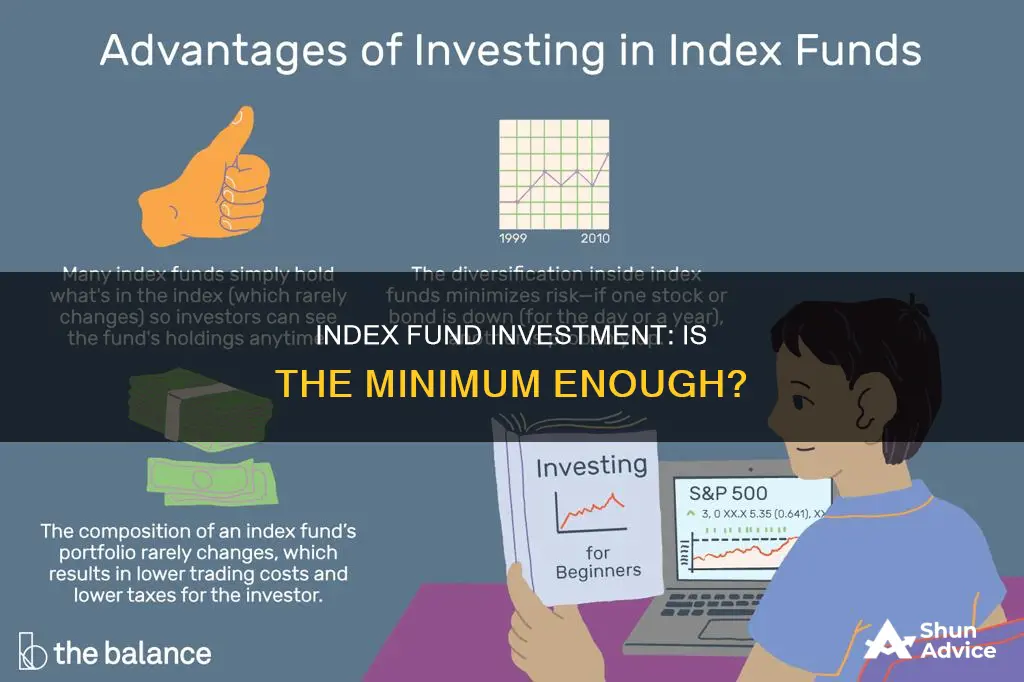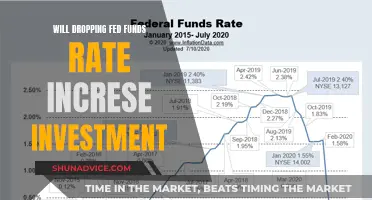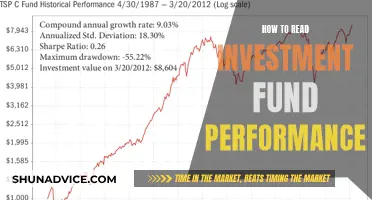
Index funds are a popular investment choice for those seeking low-cost, diversified, and passive investments that tend to outperform many higher-fee, actively traded funds. They are designed to replicate the performance of financial market indexes, like the S&P 500, and are ideal for long-term investing, such as retirement accounts. While index funds offer advantages like lower risk through diversification and solid long-term returns, they are also subject to market swings and lack the flexibility of active management. Despite these limitations, their consistent performance has made them a staple in many investment portfolios. When considering an index fund investment, it is important to assess your investment objectives and risk tolerance and consult a financial advisor for personalized advice.
| Characteristics | Values |
|---|---|
| Type of fund | Mutual or exchange-traded fund (ETF) |
| Investment type | Stocks or bonds |
| Investment strategy | Passive |
| Performance | Aims to mirror a specific market index |
| Management | Fund managers ensure the fund performs the same as its target index |
| Costs | Low fees and expenses |
| Risk | Lower risk due to diversification |
| Returns | Solid long-term returns |
| Suitability | Good for beginners and expert investors |
What You'll Learn

What are the benefits of index funds?
Index funds are a great investment for building wealth over the long term. They are a type of mutual or exchange-traded fund (ETF) that tracks the performance of a market index, such as the S&P 500, by holding the same stocks or bonds or a representative sample of them.
Broad Diversification
Index funds provide instant diversification, reducing the likelihood of losing money. For example, an index fund tracking the S&P 500 would hold about 500 different stocks, with the performance of each fluctuating over time. By investing in a fund that holds all of them, your portfolio's performance matches that of the index itself. Diversifying your portfolio across so many companies ensures that its value is not overly dependent on the fortunes of any one company in the index.
Low Costs
Index funds have lower management fees than other funds because they are passively managed. Instead of having a manager actively trading, the index fund's portfolio simply duplicates that of its designated index. Index funds also have lower transaction costs as they trade in and out of securities less frequently, resulting in lower capital gains taxes.
Attractive Returns
Index funds have consistently outperformed other types of funds in terms of total return, even beating actively managed funds. This is because they aim to mirror the performance of the financial markets over time, turning your investment into a substantial sum in the long run.
Tax Efficiency
Index funds are tax-efficient compared to many other investments. They generally don't have to buy and sell holdings as often as actively managed funds, so they avoid generating capital gains that can increase your tax bill. Additionally, they can choose which lots to sell when selling a particular security, selecting those with the lowest capital gains and, therefore, the lowest tax liability.
Minimal Research Required
You can rely on the index fund's portfolio manager to match the underlying index's performance over time, requiring minimal investment research on your part.
Managed Investment Risk
The diversification of index funds means you are less likely to suffer significant losses if something negative happens to one or two companies in the index.
Wide Range of Choices
There are hundreds of indexes to choose from, including large U.S. stocks, small U.S. stocks, international stocks, and bonds. You can also buy broad index funds, such as those tracking the S&P 500, or more focused funds targeting specific sectors or trends like artificial intelligence stocks.
Ease of Use
Index funds are one of the easiest ways for investors to build wealth. You don't need to become a stock market expert, and they are a passive investment, allowing you to invest month after month while ignoring short-term fluctuations.
Funds for Down Payment: Invest or Save?
You may want to see also

What are the drawbacks of index funds?
Index funds are a popular investment choice, but they do have some drawbacks. Here are some of the key disadvantages to be aware of:
- Lack of Downside Protection: One of the main drawbacks of index funds is the lack of downside protection. In prolonged downward trends, index funds can perform poorly in line with the broader market. When the market declines, so does the value of index funds.
- Lack of Flexibility: Index funds are designed to mirror a specific market index, and they cannot pivot or adapt when the market shifts. They are also limited to well-established investment styles and sectors.
- Inclusion of Poor-Performing Stocks: Index funds automatically include all the securities in an index, which means they may invest in overvalued or weak companies. This can drag down returns and limit the potential for higher gains.
- Market-Cap Weighting: Many index funds use market-cap weighting, where companies with higher market capitalisations have a more significant influence on the fund's performance. This can lead to a concentration of risk in a few large companies.
- Limited Choice: Investors have no choice over the composition of an index fund and cannot add or remove holdings. This lack of customisation may not suit all investment goals and strategies.
- Delayed Gains: Index funds may experience delayed gains compared to more aggressive, actively managed funds. The passive nature of index funds means they may not react as quickly to market opportunities.
- Sizable Starting Investment: While some index funds have no minimum requirements, others demand sizable starting investments. Accessing the best shares may require an initial investment of several thousand dollars.
Large-Cap Growth Fund: A Smart Investment Strategy
You may want to see also

How do I choose an index fund?
Index funds are a type of mutual or exchange-traded fund (ETF) that tracks the performance of a market index, such as the S&P 500, by holding the same stocks or bonds or a representative sample of them. Index funds are defined as investments that mirror the performance of benchmarks like the S&P 500 by mimicking their makeup.
- Investment Objective: Determine your investment goals and risk tolerance. Are you investing for the long term, retirement, or do you have a shorter-term goal? Index funds are typically suitable for long-term investing.
- Index and Fund Selection: Choose the market index you want to track, such as the S&P 500, Dow Jones Industrial Average, or Russell 2000. Then, select an index fund that closely tracks the performance of that index. Consider the fund's fees, investment minimums, and historical performance.
- Diversification: Index funds provide diversification by investing in a range of stocks or bonds within the index. Diversification can help reduce risk by spreading your investments across various sectors and asset classes.
- Costs and Fees: Index funds are known for having lower fees than actively managed funds. Compare the expense ratios, account minimums, and investment minimums of different index funds to find the most cost-effective option. Remember that even small differences in fees can impact your long-term returns.
- Passive vs. Active Management: Index funds are passively managed, meaning they aim to replicate the performance of a specific index rather than actively selecting stocks. This passive strategy can lead to lower costs and tax efficiency but may not allow for pivoting during market shifts.
- Fund Type: Decide whether you want to invest in an index mutual fund or an ETF. Mutual funds may have minimum investment requirements, while ETFs typically do not. ETFs offer more trading flexibility and can be traded on exchanges like individual stocks.
- Brokerage Account: You will need a brokerage account, an individual retirement account (IRA), or a Roth IRA to purchase shares of an index fund. Consider the fees and features of different brokerage platforms before opening an account.
- Fund Size and Weighting: Some index funds use market-cap weighting, where larger companies have a greater influence on the fund's performance. Equal-weighted funds, on the other hand, give the same weighting to each constituent, regardless of company size.
- Professional Advice: Consider consulting a financial advisor, especially if your financial situation is complex. They can guide you in selecting index funds that align with your overall financial goals and help you build a diversified portfolio.
Remember to review your index fund investments periodically to ensure they continue to meet your financial goals and make adjustments as needed.
NRIs in the USA: Mutual Fund Investment Block
You may want to see also

How do I buy an index fund?
Have a goal for your index funds
Before investing in index funds, it is important to know what you want to achieve with your money. Index funds are ideal for long-term goals, such as retirement, as they allow your money to grow slowly over time.
Research index funds
Once you know which index you want to track, you can start looking at specific index funds to invest in. Here are some factors to consider:
- Company size and capitalisation: Index funds can track small, medium, or large companies (known as small-, mid-, or large-cap indexes).
- Geography: Some funds focus on stocks traded on foreign exchanges or a combination of international markets.
- Business sector or industry: You can choose funds that focus on specific sectors, such as consumer goods or technology.
- Asset type: There are funds that track bonds, commodities, or cash.
- Market opportunities: These funds focus on emerging markets or other growing sectors.
Pick your index funds
When choosing an index fund, cost is often a key factor. Index funds are cheap to run because they are automated to follow shifts in the value of an index. However, don't assume that all index funds are cheap; they still carry administrative costs, which are subtracted from each shareholder's returns.
Decide where to buy your index funds
You can purchase an index fund directly from a mutual fund company or a brokerage. Exchange-traded funds (ETFs) are also available for purchase from either source. When choosing where to buy, consider factors such as fund selection, convenience, trading costs, impact investing, and commission-free options.
Purchase your index fund
After deciding on a fund, you will need to open an investment account. A brokerage account, individual retirement account (IRA), or Roth IRA will all work. You can then buy the fund within that account. When purchasing, you may be able to select a fixed dollar amount or choose a number of shares based on the share price and your budget.
Keep an eye on your index funds
Index funds are passive investments, but it is important to monitor their performance over time. Check that your index fund is mirroring the performance of the underlying index. Also, be mindful of any fees that may stack up over time, as these can impact your returns.
Should I invest in the minimum index fund?
Index funds are a popular investment choice due to their low costs, diversification benefits, and long-term performance. They are suitable for beginners as they require minimal investment research and offer a simple way to build wealth.
However, it is important to remember that index funds have limitations. They are designed to match the market's performance, so there is no potential to outperform the benchmark. They can also be volatile, especially during economic downturns, and may include stocks you would rather not own.
When deciding whether to invest in the minimum index fund, consider your financial goals, risk tolerance, and the time horizon for your investments. Index funds are generally recommended for long-term goals, such as retirement, rather than short-term investments.
Corporations' Hesitance Towards Mutual Funds: Exploring the Why
You may want to see also

Are index funds good for beginners?
Index funds are a great option for beginners looking to invest. They are a simple, cost-effective way to hold a broad range of stocks or bonds that mimic a specific benchmark index, meaning they are diversified.
Index funds are a type of mutual or exchange-traded fund (ETF) that tracks the performance of a market index, such as the S&P 500, by holding the same stocks or bonds or a representative sample of them. They are passively managed, meaning they don't require active decision-making or market timing. This passive management strategy means they are less volatile and can help balance the risk in an investor's portfolio.
Index funds are also attractive to beginners because of their low costs and fees. They typically have lower expense ratios than actively managed funds, as they don't require analysts and portfolio managers to choose stocks and time trades. For example, the Vanguard S&P 500 ETF has an expense ratio of 0.03%, meaning you pay $3 annually for every $10,000 invested.
Index funds are also a good option for beginners because they offer immediate diversification. With one purchase, investors can own a wide range of companies across various sectors and asset classes. This diversification reduces risk and means you are less likely to suffer big losses.
However, one disadvantage of index funds is their lack of flexibility. They are designed to mirror a specific market, so they will decline in value when the market does, and they cannot pivot away when the market shifts.
Overall, index funds are a good option for beginners as they are a simple, low-cost, and diversified investment strategy that can help build wealth over the long term.
Mutual Funds: Aggressive Investment Strategies for High Returns
You may want to see also







